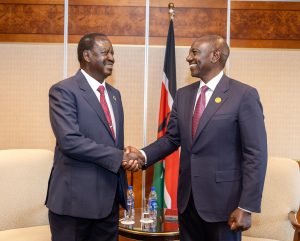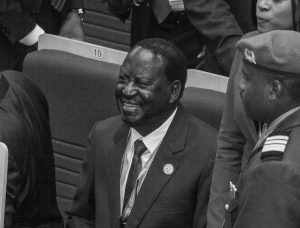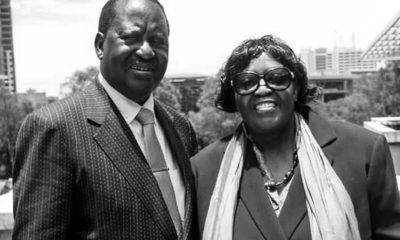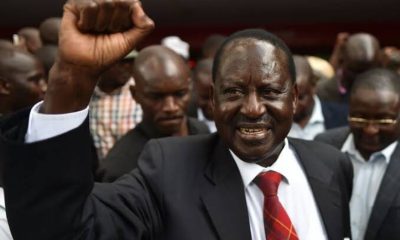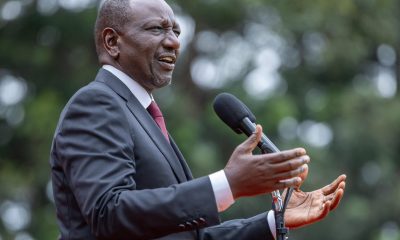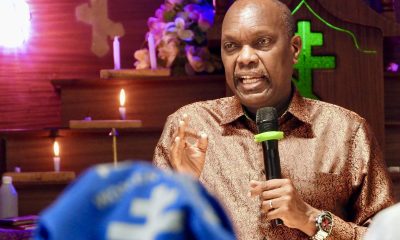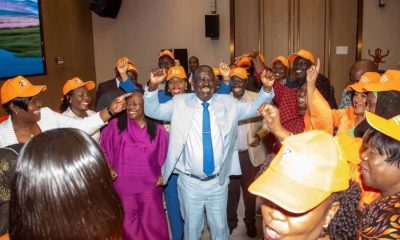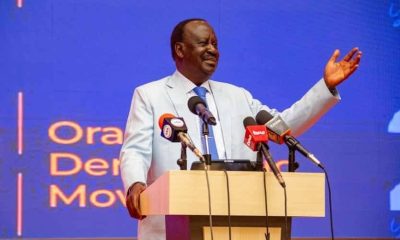Africa
Diplomatic Goof: How Raila Lost AUC
Mahmoud Ali Youssouf of Djibouti emerged victorious in a fiercely contested race that, despite early signs of a Raila win, ultimately saw his campaign unravel under a series of diplomatic missteps and shifting regional alliances.
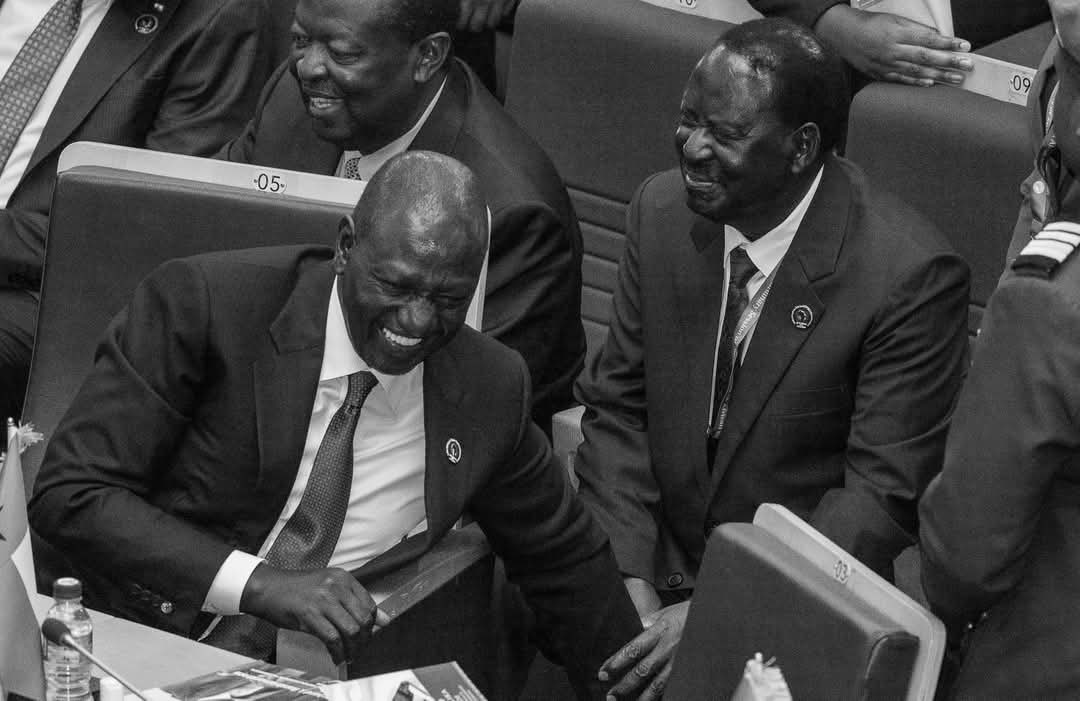
In a stunning turn of events at the African Union Commission (AUC) summit in Addis Ababa on February 15, 2025, former Prime Minister Raila Odinga watched helplessly as the chairmanship slipped from his grasp.
Mahmoud Ali Youssouf of Djibouti emerged victorious in a fiercely contested race that, despite early signs of a Raila win, ultimately saw his campaign unravel under a series of diplomatic missteps and shifting regional alliances.
From Frontrunner to Fading Hope
For months, Raila Odinga crisscrossed Africa, engaging with presidents and government heads to secure backing for his bid to lead the AUC. In the initial rounds of voting, Raila appeared poised for a sweeping victory, amassing a majority of votes and building momentum among the continent’s anglophone states.
However, as the rounds progressed, a convergence of factors both external and internal began to work against him.
The Francophone Factor
One of the most significant hurdles in Raila’s campaign was the entrenched influence of Francophone nations within the African Union. Despite his team’s early dismissal of the Francophone bloc as a decisive factor, it became clear during the voting process that language and regional alliances played a pivotal role. Raila led in the initial rounds, but after the elimination of Madagascar’s Richard Randriamandrato, a Francophone candidate, votes shifted overwhelmingly to Djibouti’s Ali Youssouf.
Djibouti, a member of the National Ozone Officers Network for French-Speaking Africa, leveraged its position within the 26-member Francophone bloc to secure support. Former UNCTAD Secretary-General Mukhisa Kituyi had earlier warned that Raila’s non-Francophone background would be a disadvantage
“Normally, it is extremely difficult for the bloc to vote for a non-Francophone speaker if there is a French speaker among the candidates,” Kituyi noted. This prediction proved accurate, as Youssouf clinched the chairmanship with 33 votes in the sixth round.
Ruto’s Pro-Israel Stance and Pan-Africanism Questions
Another critical factor that may have cost Raila the AUC seat was Kenya’s foreign policy stance under President William Ruto.
Ruto’s unequivocal support for Israel during the October 2023 Hamas-Israel conflict drew sharp criticism from pro-Palestine African nations.
During the AUC summit, Palestinian Authority President Mahmoud Abbas was a guest, underscoring the continent’s solidarity with Palestine.
“Kenya has taken a position that is contra-Palestine,” noted legal expert Migai Akech. “This likely alienated some African states that view the Palestinian cause as a symbol of anti-colonial struggle.”
Raila, despite his pan-African credentials, was unable to distance himself from Ruto’s controversial stance, which may have eroded his support among member states.
Additionally, Ruto’s handling of the Democratic Republic of Congo (DRC) crisis further damaged Kenya’s pan-African image.
By seeking French President Emmanuel Macron’s intervention in the conflict, Ruto was seen as sidelining African-led solutions, a move that did not sit well with other African leaders. “Kenya has not been seen to be advancing a pan-African position in DRC,” Professor Migai observed, adding that this could have influenced voting patterns.
The SADC Bloc and Anglophone Divide
Raila’s campaign had initially gained traction among Anglophone nations, with endorsements from key players like Uganda’s Yoweri Museveni and Tanzania’s Samia Suluhu Hassan.
However, the Southern African Development Community (SADC), a 16-member bloc, threw its weight behind Madagascar’s Randriamandrato in a last-minute decision. This move split the vote in the early rounds, leaving Raila vulnerable in the final tally.
Uganda’s Museveni, a vocal Raila supporter, notably skipped the voting session, depriving Raila of a crucial vote.
Analysts suggest that Kenya’s involvement in the DRC conflict, where SADC is also active, may have influenced the bloc’s decision to back Randriamandrato initially and later shift support to Youssouf.
Internal Kenyan Issues
Raila’s campaign was also hampered by internal challenges within Kenya. The Ruto administration has faced criticism over a spate of abductions, including the high-profile case of Ugandan opposition leader Kizza Besigye, who was seized in Nairobi and extradited to Uganda.
These incidents raised questions about Kenya’s commitment to human rights and the rule of law, tarnishing Raila’s image as a champion of democracy.
“Why must Africa consider you when your country cannot provide answers on abduction cases in Kenya?” asked Sophie Mokoena, an international news editor for South Africa’s SABC, in a viral social media post.
The abductions, coupled with Kenya’s domestic unrest, painted a picture of a nation struggling with internal stability, which may have deterred some AU member states from supporting Raila.
A Missed Opportunity
In his concession speech, Raila hinted at “last-minute factors” that contributed to his loss, promising to reveal them in due course. While his campaign was well-organized and widely supported, the combination of Francophone influence, Kenya’s foreign policy missteps, and internal issues proved insurmountable.
Raila’s defeat underscores the complex interplay of regional alliances, language politics, and domestic factors in continental elections.
For Kenya, the loss is a diplomatic setback, highlighting the need for a more cohesive and pan-African foreign policy approach.
As Mahmoud Ali Youssouf takes the helm of the AUC, the continent will be watching to see if he can bridge the divides that defined this election.
For Raila, this may not be the end of his continental ambitions. But for now, the AUC chairmanship remains an elusive dream, lost in a web of diplomatic miscalculations and regional rivalries.
Kenya Insights allows guest blogging, if you want to be published on Kenya’s most authoritative and accurate blog, have an expose, news TIPS, story angles, human interest stories, drop us an email on [email protected] or via Telegram
-

 News4 days ago
News4 days agoKenyan Driver Hospitalized After Dubai Assault for Rejecting Gay Advances, Passport Seized as Authorities Remain Silent
-
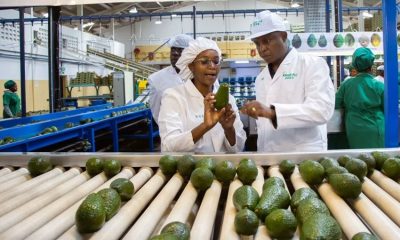
 Business1 week ago
Business1 week agoKakuzi Investors Face Massive Loss as Land Commission Drops Bombshell Order to Surrender Quarter of Productive Estate
-
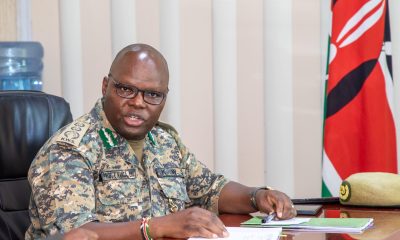
 Investigations2 weeks ago
Investigations2 weeks agoINSIDER LEAK REVEALS ROT AT KWS TOP EXECUTIVES
-

 Business5 days ago
Business5 days agoConstruction Of Stalled Yaya Center Block Resumes After More Than 3 Decades and The Concrete Story Behind It
-

 Investigations1 week ago
Investigations1 week agoCNN Reveals Massive Killings, Secret Graves In Tanzania and Coverup By the Govt
-
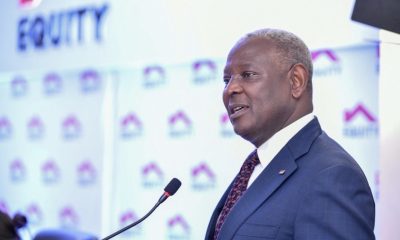
 Business2 weeks ago
Business2 weeks agoBANKS BETRAYAL: How Equity Bank Allegedly Helped Thieves Loot Sh10 Million From Family’s Savings in Lightning Fast Court Scam
-

 Investigations6 days ago
Investigations6 days agoHow Somali Money From Minnesota Fraud Ended In Funding Nairobi Real Estate Boom, Al Shabaab Attracting Trump’s Wrath
-
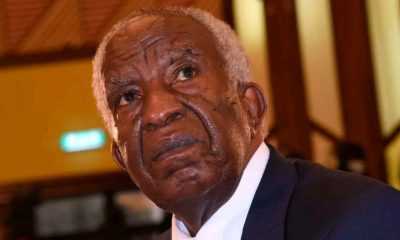
 News2 weeks ago
News2 weeks agoEXPOSED: How Tycoon Munga, State Officials, Chinese Firm Stalled A Sh3.9 Trillion Coal Treasure In Kitui

